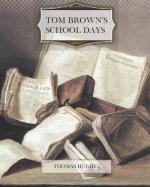His wife seconded him in everything. She had
been rather fond of society, and much admired and
run after before her marriage; and the London world
to which she had belonged pitied poor Fanny Evelyn
when she married the young clergyman, and went to
settle in that smoky hole Turley; a very nest of Chartism
and Atheism, in a part of the country which all the
decent families had had to leave for years. However,
somehow or other she didn’t seem to care.
If her husband’s living had been amongst green
fields and near pleasant neighbours she would have
liked it better—that she never pretended
to deny. But there they were. The air wasn’t
bad, after all; the people were very good sort of
people—civil to you if you were civil to
them, after the first brush; and they didn’t
expect to work miracles, and convert them all off-hand
into model Christians. So he and she went quietly
among the folk, talking to and treating them just as
they would have done people of their own rank.
They didn’t feel that they were doing anything
out of the common way, and so were perfectly natural,
and had none of that condescension or consciousness
of manner which so outrages the independent poor.
And thus they gradually won respect and confidence;
and after sixteen years he was looked up to by the
whole neighbourhood as the just man, the man to whom
masters and men could go in their strikes, and in
all their quarrels and difficulties, and by whom the
right and true word would be said without fear or favour.
And the women had come round to take her advice, and
go to her as a friend in all their troubles; while
the children all worshipped the very ground she trod
on.
They had three children, two daughters and a son,
little Arthur, who came between his sisters.
He had been a very delicate boy from his childhood;
they thought he had a tendency to consumption, and
so he had been kept at home and taught by his father,
who had made a companion of him, and from whom he
had gained good scholarship, and a knowledge of and
interest in many subjects which boys in general never
come across till they are many years older.
Just as he reached his thirteenth year, and his father
had settled that he was strong enough to go to school,
and, after much debating with himself, had resolved
to send him there, a desperate typhus fever broke
out in the town. Most of the other clergy, and
almost all the doctors, ran away; the work fell with
tenfold weight on those who stood to their work.
Arthur and his wife both caught the fever, of which
he died in a few days; and she recovered, having been
able to nurse him to the end, and store up his last
words. He was sensible to the last, and calm and
happy, leaving his wife and children with fearless
trust for a few years in the hands of the Lord and
Friend who had lived and died for him, and for whom
he, to the best of his power, had lived and died.
His widow’s mourning was deep and gentle.
She was more affected by the request of the committee




